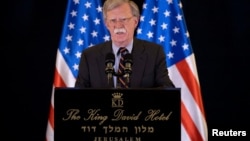U.S. President Donald Trump's national security adviser says the reimposition of economic sanctions against Iran has had a "profound effect," and the administration wants to go further than the measures in place before the 2015 Iran nuclear deal.
That agreement, struck between Iran and the United States, Britain, China, France, Russia and Germany, limited Iran's nuclear program in exchange for lifting sanctions that had hurt Iran's economy.
John Bolton said Wednesday during a visit to Israel that U.S. officials have spoken with allies about what else could be done to achieve "maximum pressure" on Iran, including further sanctions and other unspecified measures.
Critics of the nuclear agreement, including Israeli Prime Minister Benjamin Netanyahu, say Iran got too much while giving up too little and retained an ability to pursue nuclear weapons.
"The Iran nuclear deal mitigated the effects of its mismanagement of the economy and gave the regime new life," Bolton said. "Gave this regime that’s been the central banker of international terrorism since 1979 new assets that it could use for its nuclear weapons program, for its ballistic missile program, for its terrorist support activities, for its conventional military activities."
Iran insists its nuclear program has been for peaceful purposes. The International Atomic Energy Agency, which was tasked by the U.N. Security Council with monitoring Iran's compliance, has reported Iran is living up to its part of the agreement.
Bolton said the United States is not advocating "regime change" in Iran, but wants the Iranian government to change its behavior. If it does, he said, "there's a possibility of a settlement."
He continued to focus on Iran as he discussed the situation in Syria, saying the U.S. does not want to see Iran achieve what he said was an obvious Iranian plan to "create an arc of control" stretching across Iraq and Syria and linking with its ally Hezbollah in Lebanon.
Bolton said he would be discussing Iran's presence in Syria with his Russian counterpart during a meeting Thursday in Geneva, following up on similar talks between Trump and Russian President Vladimir Putin last month.
He also warned Syrian President Bashar al-Assad not to carry out further chemical weapons attacks.
"We had hoped that our strikes had created structures of deterrence to convince the Assad regime not to do that. We hope that's right. But just so that there's no confusion here, if they Syrian regime uses chemical weapons, we will respond very strongly," Bolton said.
The Trump administration has been working on its plan for bringing long-sought peace between the Israelis and Palestinians, but has yet to publicly disclose its approach.
Bolton said Wednesday that "work continues" but no decision has been made on the timing of announcing those details.
"I think there's been a lot of progress in relations in the region as a result of the process of going through the possible outlines of what the plan would look like," he said. Bolton added that any agreement would be ultimately up to the parties themselves and not something forced by the United States.
He also praised Trump's decision to move the U.S. embassy to Jerusalem and declare the city the capital of Israel, saying those steps brought "reality" to the peace negotiations.
"I think in that sense it was a very positive step forward, not just for Israel, but for the Palestinians as well."
Palestinian leaders strongly rejected both moves and said the United States could no longer play a role in the peace process.





